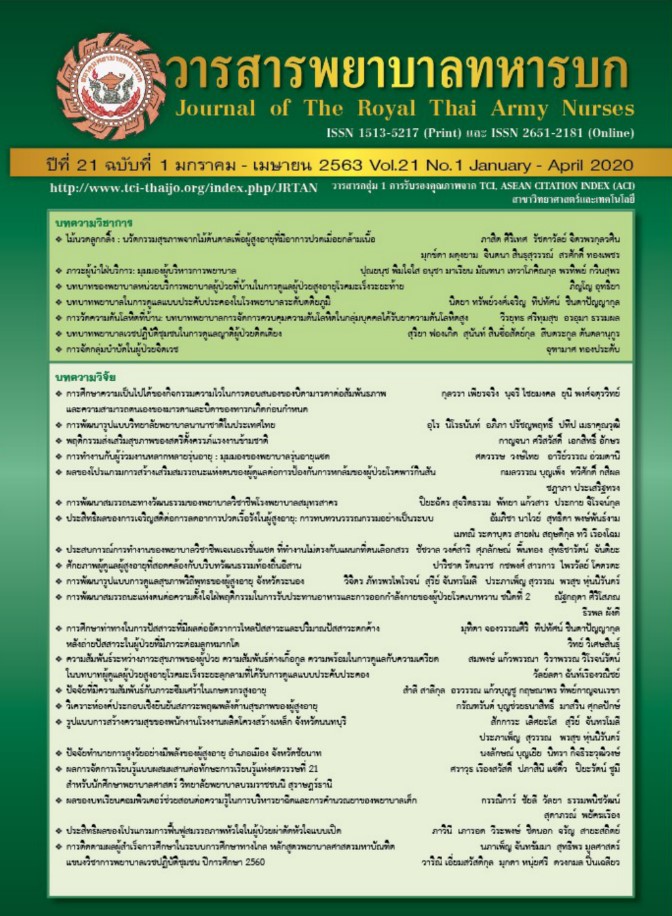The Relationships Between Patient’s Health Status, Mutuality, Preparedness, and Caregiver Role Strain in Caregivers of Older Persons with Advanced Cancer Receiving Palliative Care
Keywords:
Health status, Mutuality, Preparedness, Caregiver role strain, Caregivers of older persons with advanced cancerAbstract
This study aimed to explore the relationships between patient’s health status, mutuality, preparedness, and caregiver role strain in caregivers of older persons with advanced cancer receiving palliative care. The Family Care Model of Archbold & Stewart was selected as the conceptual framework. The sample composed of 78 family caregivers for older persons with advanced cancer receiving palliative care. Data were collected by completing Family Care Inventory questionnaires. The data obtained were analyzed using descriptive statistics and correlation analysis using Spearman’s correlation.
The research findings revealed that the older persons with advanced cancer receiving palliative care had stable health status, the PPS scale ranged from 70 - 90 (47.4 %), mutuality was at an average level (Mean = 38.87, S.D. = 7.64), preparedness was rather high (Mean = 18.15, S.D. = 3.50), and caregiver role strain including direct care, communication problems, and global strain was rather low, but had a rather high level of caregiver role strain due to role conflict. Patient’s health status was found to be negatively related to caregiver role strain from communication problems with statistical significance (r = -.423, p < .05), but patient’s health status was not related to caregiver role strain from direct care, role conflict, and global strain. Finally, both mutuality and preparedness were not related to caregiver role strain in caregivers. The study findings could be utilized to assess patient’s health status for care planning and for providing information to patients and families which could help reduce caregiver role strain due to communication ploblems.
Downloads
References
National Cancer Institute. Hospital Based Cancer Registry 2015. Bangkok: Pornsup Printing; 2017. (in Thai)
Petpichetchian W. Best nursing practice in cancer care. Songkla: Chanmuang Printing; 2011. (in Thai)
Wang SY, Tsai CM, Chen BC, Lin CH, Lin CC. Symptoms clusters and relationships to symptom interference with daily life in Taiwanese lung cancer patients. Journal of Pain and Symptom Management. 2008; 35: 258-266.
Dobrina R, Tenze M, Palese A. An overview of hospice and palliative care nursing models and theories. Int J Palliat Nurs. 2014. 20(2): 75-81.
Meecharoen W. Family Caregivers of Cancer Patient: Roles’ Adaptation and Quality of Life Promotion. Rama Nurs J. 2014; 20(1): 10-22. (in Thai)
Archbold PG, Stewart BJ, Greenlick MR, Harvath T. Mutuality and preparedness as predictors of caregiver role strain. Res Nurs Health. 1990; 13: 375-384.
Archbold PG, Stewart BJ. Family Cargiving Inventory [Unpublished manuscript]. Portland: Oregon Health & Sciences University; 1986.
Hung JW, Huang YC, Chen JH, Liao LN, Lin CJ, Chuo CY, Cheng KC. Factors associated with strain in informal caregivers of stroke patients. Chang Gung Med J. 2012; 25(5): 392-400.
Gray R, Thapsuwan S. Factors Affecting on Stress of Caregivers to Older Persons. Songklanagarind Medical Journal. 2014; 20(1): 200-228. (in Thai)
Park EO, Schumacher KL. The state of the science of family caregiver-care receiver mutuality: a systematic review. Nursing Inquiry. 2013: 1-13.
Schumacher KL, Stewart BJ, Archbold PG, Caparro M, Mutale F, Agrawal S. Effects of caregiving demand, mutuality, and preparedness on Family Caregiver outcomes during cancer Treatment. Oncology Nursing Forum, 2008; 35(1): 49-56.
Prachuablarp C, Wirojratana V, Jitramontree N, Viriyavejakul A. The Relationships Between Mutuality, Predictability and Caregiver Role Strain in Older Persons With Pakinson’s Disease. Journal Of Royal Thai Army Nurses. 2014; 15(3): 235-245. (in Thai)
Sutthilak C, Wirojratana V, Puwarawuttipanit W, Cheewakriengkrai L. Factors Predicting Health Status on Caregivers of Elderly People with Dementia. Journal Of Royal Thai Army Nurses. 2018; 19(1): 191-200. (in Thai)
Wirojratana V. Development of the Thai Family Care Inventory [Doctoral dissertation]. Portland: Oregon Health & Science University; 2002.
Rojpalakorn GP, Leucha Y. Statistic for nursing research : SPSS for Windows. Bankok: Chudthong print; 2013. (in Thai)
Chewasakulyong B, Sapinun L, Downing GM, Intaratat P, Lesperance M, Leautrakul S, Somwangprasert A, Leerapan T. Reliability and validity of the Thai transalation (Thai PPS Adult Suandok) of the palliative performance scale (PPSv2). Palliative medicine. 2011; 26(8): 1034-1041.
Makmai S, Sirichayanugul C, Sirichayanugul T. Common Symptoms and Needs of Pre-Discharge Advanced-Stage Cancer Patients: a case-Study at Phrae Hospital, Thailand. Thai Cancer Journal. 2013; 33(4)1: 32-145. (in Thai)
Girgis A, Lambert S, Johnson C, Waller A, & Currow D. Physical psychosocial relationships and economic burden of caring for people with cancer: A review. Journal of Oncology Practice. 2013; 9(4): 197-202.
Fujinami R, Sun V, Zachariah F, Uman G, Grant M, Ferrell B. Family caregivers' distress levels related to quality of life, burden, and preparedness. Psycho-Oncology. 2015; 24(1): 54-62.
Downloads
Published
How to Cite
Issue
Section
License
บทความหรือข้อคิดเห็นใดใดที่ปรากฏในวารสารพยาบาลทหารบกเป็นวรรณกรรมของผู้เขียน ซึ่งบรรณาธิการหรือสมาคมพยาบาลทหารบก ไม่จำเป็นต้องเห็นด้วย
บทความที่ได้รับการตีพิมพ์เป็นลิขสิทธิ์ของวารสารพยาบาลทหารบก
The ideas and opinions expressed in the Journal of The Royal Thai Army Nurses are those of the authors and not necessarily those
of the editor or Royal Thai Army Nurses Association.






